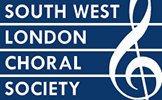Andrew Bunbury's "Waffenfreunde" performed by the Cantallini choir
The South West London Choral Society recently gave a performance of “Waffenfreunde”, a piece composed by Andrew Bunbury, who sings in the basses. Here's video of a later performance by the Cantallini Choir with the addition of a cello accompaniment.
Here’s Andrew’s description of the circumstances and motives for the composition:
I was inspired to compose music for John McCrae's In Flanders Fields during a visit to Ypres in 1998. My grandfather survived four years on the western front and, though he did not speak much of the experience, I was aware of how important it had been in his life and how grateful I was that, despite carrying little pieces of shrapnel in his back for some sixty years, he survived to the great age of ninety-eight and was a much loved and inspirational part of my childhood and early manhood. My other grandfather never reached the battlefield for he died on a troopship on the way from Australia.
I had to take a second look at my setting of McCrae's poem following the appalling events of 11th September 2001. It was then that I felt obliged to resuscitate an old notion of combining this setting of a poem in English with a setting in similar mode and mood of a German poem of the same vintage. Edward Lichtenstein's brief and startlingly poignant Abschied, written as early as August 1914 and only seven weeks before his death, seemed to me to be the perfect companion piece. I made a final revision of the piece in the summer of 2009 following another visit to Ypres that coincided with the death of Harry Patch, believed to be the last survivor of Passchendaele.
Both works are to be sung as part of one piece but each in its original language. I have linked the poems with deliberately banal marching songs of my own invention, translated into German by my friend, Andrea Seeling, whose inspiration also suggested the title, a made-up word that could be taken to mean "Friends in Arms". The marching songs are set to the opening bars of the national anthems of two of the main adversaries in the "war to end all wars" (who resumed their conflict just twenty-one years later) and then sung simultaneously, one in quadruple time in one key and the other in triple time in another.
McCrae clearly and accurately foresees his own death – he survived until the war's last year – and calls us to "take up our quarrel with the foe." For me "the foe" cannot be the hapless infantryman a hundred yards on the other side of "no man's land". The quarrel must be with the bunkered, blinkered men in suits or turbans (and it's almost always men), invisible in their shock-proof cellars or mountain hideouts, who play with the destinies of those they have never known in pursuit of personal goals, energetically moving coloured pins around maps of distant places indifferent to the human consequences. There are more mourners than victors after any conflict and bereavement has no respect for frontiers. This is what I am attempting to demonstrate by linking these two poems – that the death of any of our "enemies" diminishes all of us and that we have more commonality in grief than in any petty triumph.
Waffenfreunde is dedicated to all the worldwide friends we never made because their forebears did not live to beget them or their parents.
Andrew Bunbury

